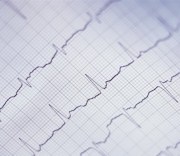Related terms: arrhythmia, sinoatrial node (SA node)
Electrical impulses from your heart muscle cause your heart to beat (contract). This electrical signal begins in the sinoatrial node, also called the SA node or the sinus node. The SA node is sometimes called the heart's "natural pacemaker." When an electrical impulse is released from the SA node, it causes the heart's upper chambers to contract.
Sick sinus syndrome is a type of arrhythmia. It is a group of signs and symptoms that tells doctors that the SA node is not working properly. The SA node usually sends electrical impulses at a certain rate, but if the SA node is not working properly, the heart may beat too fast, too slow, or both.
What causes sick sinus syndrome?
Sick sinus syndrome usually develops slowly over many years, and doctors do not always know the cause. It occurs more often in people over 50, but children may develop the condition after having open heart surgery.
What are the signs and symptoms?
Many people with sick sinus syndrome do not have symptoms, or they do not think their symptoms are serious enough for them to see a doctor.
Here are some signs and symptoms of sick sinus syndrome.
- Fainting (called syncope)
- Dizziness or lightheadedness
- Confusion that comes and goes
- Heart palpitations (the feeling that the heart has skipped a beat)
- Chest pain
- Angina
- Shortness of breath
- Fatigue
- Muscle aches
How is sick sinus syndrome diagnosed?
Sick sinus syndrome can be hard to diagnose because you may not have many symptoms. Your doctor will take a medical history, ask about your symptoms, and listen to your heart with a stethoscope. With the stethoscope, the doctor may be able to hear an irregular heartbeat, which can be a sign of sick sinus syndrome. Other diagnostic tests that your doctor may order include
- Electrocardiogram (ECG or EKG), which is the best test for diagnosing arrhythmia. This test helps doctors analyze the electrical currents of your heart and determine the type of arrhythmia you have.
- Holter monitoring, which gets a non-stop reading of your heart rate and rhythm over a 24-hour period (or longer). Doctors can then look at the recording to find out what causes your arrhythmia.
- Event monitors, which are devices that record problems that may not be found within a 24-hour period.
- Electrophysiology studies (EPS), which are usually done in a cardiac catheterization laboratory. Electrical
impulses from your heart are mapped out and help doctors find out what kind of
arrhythmia you have.
How is sick sinus syndrome treated?
If you do not have any symptoms, you will not need treatment for sick sinus syndrome. If you do have symptoms, your doctor may want you to stop taking certain medicines and avoid food and drinks that make your symptoms worse.
If sick sinus syndrome is causing a slow heart rate (bradycardia), you may need to have a pacemaker implanted and you may need to take antiarrhythmic medicines.
If sick sinus syndrome is causing a fast heart rate (tachycardia), it may be treated with antiarrhythmic medicines. Sometimes a procedure called radiofrequency ablation is also recommended to treat tachycardia.
See on other sites:
MedlinePlus
https://medlineplus.gov/ency/article/000161.htm
Sick sinus syndrome
Updated August 2016



